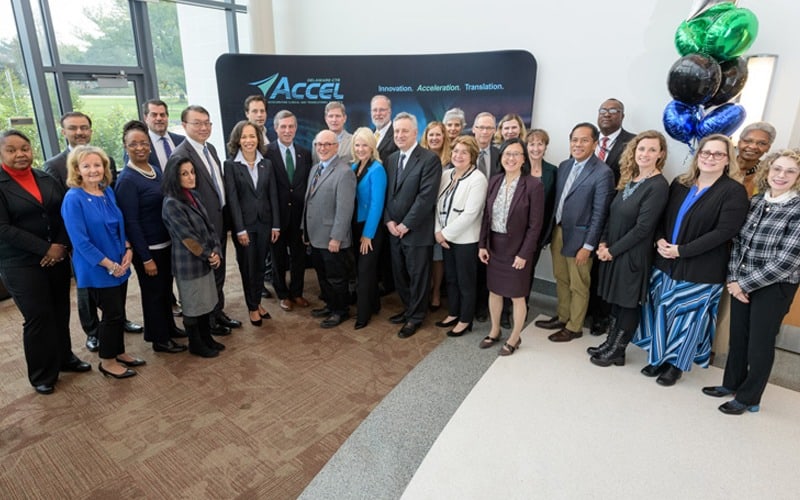 Research & Discovery
Research & Discovery
A Blog Devoted to UD Innovation, Excellence and Scholarship
Research & Discovery
A Blog Devoted to UD Innovation, Excellence and Scholarship
$25 Million for Research
ABOVE: Leaders gather for a ceremony in the atrium of UD’s Science, Technology and Advanced Research (STAR) Campus. The event celebrated a five-year $25 million renewal of the Delaware Center for Translational Research ACCEL Program, which is funded by the National Institutes of Health (NIH) and the State of Delaware. UD is the lead institution, but the group includes Christiana Care Health System, Nemours/Alfred I. duPont Hospital for Children, Delaware State University and the Medical University of South Carolina (MUSC). | Photo by Evan Krape
UD is lead institution in program funded by NIH, State of Delaware
The University of Delaware and four other institutions will receive $25 million over five years from the National Institutes of Health and the state of Delaware to continue research programs that improve patient care and public health, officials announced Friday.
Delaware’s Center for Translational Research ACCEL Program will continue its efforts to bolster and expand clinical and translational research in the First State, thanks to the grant renewal from the federal and state agencies.
As part of the renewal, the ACCEL Program grows to five institutions with Delaware State University joining UD, Christiana Care Health System, Nemours/Alfred I. duPont Hospital for Children and the Medical University of South Carolina (MUSC) to support faculty who are interested in research by providing access to needed funding and professional development programs.
“These partnerships are essential to increasing research opportunities that lead to innovations in healthcare, further develop our biomedical workforce and improve the health of our residents,” said UD President Dennis Assanis. “We all benefit when faculty members have access to the resources they need to effectively collaborate on clinical and translational research. What’s most important is that this program can help lead to better outcomes in diagnosing, managing and treating the health conditions that most affect our state and the nation.”





